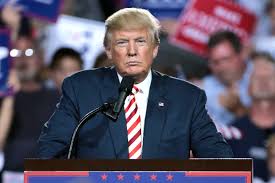
Trump Threatens Canada: Pay $61 Billion for Golden Dome or Face Becoming 51st U.S. State

 :
| Updated On: 28-May-2025 @ 4:09 pm
:
| Updated On: 28-May-2025 @ 4:09 pmSHARE
United States President Donald Trump recently issued a stark ultimatum to Canada regarding his ambitious missile defense initiative, the Golden Dome system. Trump stated that Canada must pay $61 billion to be included in this defense network if it chooses to remain a separate nation with unequal status compared to the US. However, if Canada agrees to become the 51st state of the United States, it would be allowed to participate in the system free of charge. This message was conveyed through Trump’s post on his social media platform TruthSocial, where he claimed Canada was keen to join the Golden Dome system and was actively considering his offer.
This announcement came shortly after Canada’s Parliament hosted King Charles III of the United Kingdom, who delivered a rare royal speech emphasizing the importance of Canadian sovereignty during “dangerous and uncertain” times. The king’s speech underscored Canada’s independent status just as Trump was publicly urging Canada to join the US as a state. In response to these developments, Canadian Prime Minister Mark Carney expressed hopes that Canada would reduce its reliance on the US for military weapons by joining the ReArm Europe initiative by July 1. While Canada has not officially responded to Trump’s latest statement, Carney previously confirmed that high-level talks with the US on missile defense cooperation had taken place.
Trump has projected that the total cost of the Golden Dome missile defense system will be about $175 billion, with a goal to complete the project by the end of his current presidential term in 2029. However, defense experts have expressed skepticism about both the budget and the timeline for such an extensive project. To finance this, Trump is seeking initial funding of $25 billion through a legislative proposal called the “Big, Beautiful Bill,” which recently passed the Republican-controlled House of Representatives and is pending a Senate vote. The bill includes increased spending on military and border enforcement but cuts to social programs such as Medicaid and food assistance, which benefit millions of low-income Americans.
The Golden Dome system is inspired by Israel’s Iron Dome, which receives about $500 million annually in US funding for maintenance. However, the Iron Dome primarily targets short-range missiles and covers a relatively small area comparable to the size of New Jersey, a US state much smaller than the entire country. Trump’s plan would require a massive scaling up of this technology to cover the entire United States, including defense against long-range ballistic and hypersonic missiles, which are considered the primary threats.
The proposal to militarize space through the Golden Dome has drawn strong criticism from global powers. China, North Korea, and Russia have voiced concerns that the system could trigger a new arms race in space, destabilize international security, and militarize outer space. China’s Foreign Ministry spokesperson Mao Ning stated that the US plan prioritizes American security at the expense of global stability and increases the risk of space becoming a battlefield. North Korea accused the US of aggressively pursuing the militarization of space. Russian Foreign Ministry spokeswoman Maria Zakharova described the Golden Dome as a threat to strategic stability, warning it could lead to “pre-emptive” strikes and transform space into a “weaponized environment” and a zone of armed conflict.
In summary, Trump’s Golden Dome missile defense proposal represents a highly ambitious and costly attempt to expand US defensive capabilities into space. It involves tough demands on allies like Canada, significant domestic political maneuvering for funding, and has triggered international concerns about the future militarization of space and global strategic stability.
Contact Us
House. No. : 163, Second Floor Haridev Rd, near Puberun Path, Hatigaon,Guwahati, Assam 781038.
E-mail : assaminkcontact@gmail.com
Contact : +91 8811887662
Enquiry
×
Reporter Login
×